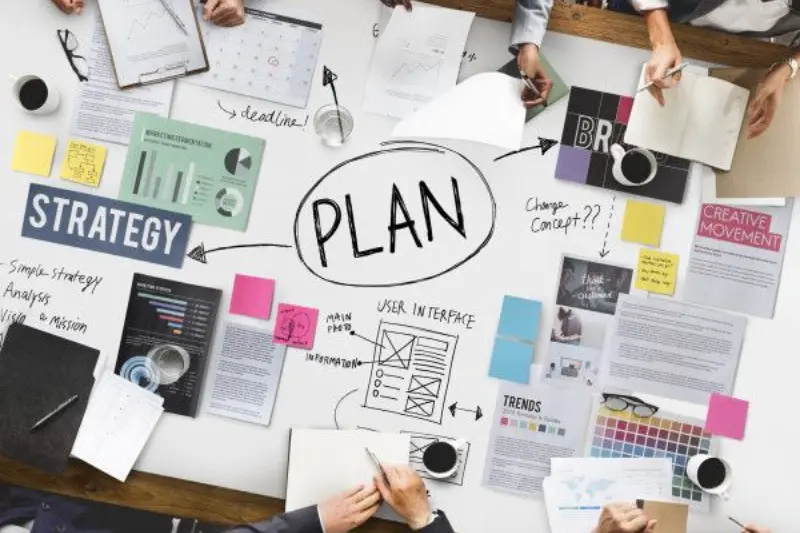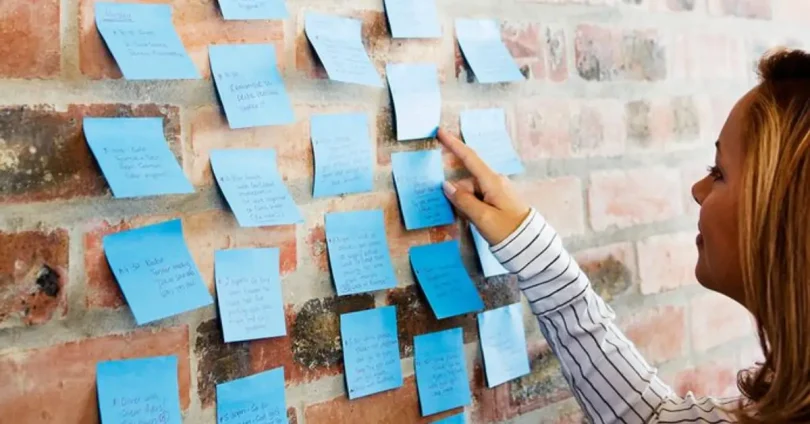Productivity at work means getting important tasks done in an efficient and effective way. It’s not about working longer hours, but about making the best use of your time and energy.
Being productive matters because it helps you achieve your goals, meet deadlines, and reduce stress. It also creates a healthy balance between professional success and personal well-being.
In this article, we’ll share How to improve productivity at work that will help you improve productivity at work, stay focused, and work smarter every day.
Set Clear Goals and Priorities

One of the biggest reasons people feel unproductive is because they don’t know what to focus on first. When everything feels urgent, it’s easy to waste time on less important tasks.(How to improve productivity at work) That’s why setting clear goals and priorities is the foundation of productivity.
A helpful way to set goals is by using the SMART method:
- Specific: Clearly define what needs to be done (e.g., “Finish client report”).
- Measurable: Decide how you’ll track progress (e.g., “Complete three sections of the report”).
- Achievable: Keep goals realistic so you don’t feel overwhelmed.
- Relevant: Focus on tasks that truly support your work or company goals.
- Time-bound: Give yourself a deadline (e.g., “Submit by 5 PM”).
Along with setting SMART goals, use a simple daily to-do list. Writing down your top 3–5 tasks helps you stay on track and avoid distractions. Plus, checking items off your list gives a sense of achievement and motivates you to keep going.
Manage Your Time Wisely
Time management is one of the most important skills for boosting productivity. By planning your day properly, you can stay focused and get more done without unnecessary stress.
Time Blocking
Time blocking means dividing your day into sections and assigning each section to a specific activity. For example, you could handle emails in the morning, focus on deep work before lunch, and reserve the afternoon for meetings. This method gives your day structure and prevents multitasking.
Pomodoro Technique
The Pomodoro method is simple yet powerful. Set a timer for 25 minutes and work only on one task during that time. Afterward, take a 5-minute break. Repeat this cycle four times, then take a longer break of 15–30 minutes. This technique helps you stay fresh and avoid burnout.
Start with the Hardest Task
Begin your day by tackling the most important or difficult task first. Once it’s done, you’ll feel a sense of relief and motivation, making the rest of your tasks much easier to complete.
Minimize Distractions
Distractions are one of the biggest reasons for lost productivity at work. Even small interruptions can break your focus and make it hard to get back on track. By learning how to manage them, you can save time and work more efficiently.

Common Distractions at Work
Some of the most common distractions include:
- Constant phone notifications
- Social media scrolling
- Unnecessary phone calls or chats
- Background noise in the office
- Long or unplanned meetings
These interruptions may seem small, but together they can take away hours of your day.
Practical Tips to Reduce Them
A few simple habits can help you stay focused:
- Turn off non-essential notifications on your phone and computer.
- Keep your workspace tidy and free from distractions.
- Use focus tools or apps that block social media during work hours.
- If possible, find a quiet spot or use headphones to minimize noise.
Learn to Say “No”
Not every meeting or task requires your presence. If you feel that a meeting isn’t important or doesn’t add value, politely decline or suggest an email update instead. Saying “no” to unnecessary commitments protects your time and helps you focus on what truly matters.
Take Regular Breaks
Many people believe working for long hours without stopping increases productivity, How to improve productivity at work but the truth is the opposite. Your brain needs rest to stay sharp. Regular breaks give your mind and body a chance to recharge, which improves focus and energy throughout the day.
Why Breaks Are Important for the Brain
How to improve productivity at work When you work non-stop, your concentration levels drop, and mistakes become more likely. Short breaks help reset your brain, reduce stress, and boost creativity. Think of it as giving your mind a quick refresh so you can return to tasks with more clarity.
Examples of Short Break Activities
Breaks don’t have to be long or complicated. Even 5–10 minutes can make a big difference. Here are some ideas:
- Take a short walk to stretch your legs.
- Do light stretching or desk exercises.
- Practice deep breathing or mindfulness.
- Drink water or have a healthy snack.
- Step away from your screen to rest your eyes.
These small actions keep your body active and your mind refreshed.
You may also like to read these posts:
Simple DIY Home Projects List for Beginners You’ll Love
DIY Home Projects Types and Ideas for Every Beginner
Easy Craft Ideas to Do at Home for Fun and Creativity
Unique and Creative Gift Ideas for Friends & Family
How Breaks Improve Focus and Energy
When you pause for a short break, you allow your brain to recover from mental fatigue. This means you return to work with better focus, higher energy, and improved problem-solving skills. Regular breaks also prevent burnout, making it easier to stay productive over the long term.
Use Helpful Tools and Technology (How to improve productivity at work)
Technology can be a big advantage when it comes to improving productivity. The right tools help you stay organized, communicate effectively, and save time on routine tasks. Instead of doing everything manually, you can let technology handle some of the work for you.
Productivity Apps
Apps like Trello, Asana, and Notion are excellent for managing tasks and projects. They allow you to create to-do lists, assign tasks, set deadlines, and track progress all in one place. Google Drive is another useful tool for storing files, sharing documents, and collaborating with colleagues in real-time.
Communication Tools
Smooth communication is key to productivity. Tools like Slack and Microsoft Teams make it easier to chat with teammates, share updates, and even hold quick video calls without needing long meetings. These platforms keep everyone connected and reduce email overload.
Automation to Save Time
Repetitive tasks like sending reminders, updating spreadsheets, or scheduling posts can take up valuable time. Automation tools such as Zapier or built-in features in project management apps can handle these tasks for you. This way, you spend more time on important work instead of routine activities.
Stay Organized
How to improve productivity at work Staying organized is one of the easiest ways to improve productivity at work. A clutter-free environment helps you think more clearly, saves time, and reduces stress. When everything is in its place, you can focus better on your tasks.
Keep Your Workspace Clutter-Free
A messy desk can distract you and slow you down. How to improve productivity at work Keep only the essentials on your desk—like your laptop, notebook, and a pen. Store other items neatly in drawers or shelves. Spending just a few minutes each day tidying up can make your workspace feel more professional and peaceful.
Organize Files and Emails
Digital clutter can be just as distracting as physical clutter. How to improve productivity at work Create folders for your files and emails so you can quickly find what you need. Use labels, color codes, or tags to separate work projects. Regularly delete or archive old files and messages to keep things clean and simple (How to improve productivity at work) .
Small Daily Habits for Organization
Being organized is about consistency. Simple habits like making a to-do list every morning, checking your calendar, and setting aside 5–10 minutes to tidy up at the end of the day can keep your workflow smooth. Over time, these small habits save hours and reduce stress (How to improve productivity at work) .
Maintain Work-Life Balance
Being productive doesn’t mean working all the time. In fact, overworking can harm both your health and your performance. A balanced lifestyle ensures you have the energy, focus, and motivation to give your best at work without burning out.
Why Overworking Reduces Productivity
Working long hours without rest may feel like you’re getting more done, but it often leads to fatigue, stress, and mistakes. Over time, it reduces creativity and lowers the quality of your work. True productivity comes from working smart, not working nonstop.
Importance of Rest, Sleep, and Exercise
Your mind and body need proper care to stay sharp. Getting 7–8 hours of sleep helps you focus better and improves memory. Regular exercise boosts energy levels and reduces stress, while short breaks during the day prevent mental exhaustion. Rest is not wasted time—it’s an investment in your productivity.
Healthy Lifestyle Tips for Better Focus
- Eat balanced meals with fruits, vegetables, and proteins.
- Stay hydrated throughout the day.
- Practice mindfulness or meditation to reduce stress.
- Set boundaries by disconnecting from work after office hours.
- Spend quality time with family, friends, or hobbies to recharge.
When your lifestyle is balanced, your work performance naturally improves.
Common Mistakes to Avoid
Even with the best intentions, some habits can quietly harm your productivity. By recognizing these mistakes, you can avoid them and work more effectively.
Multitasking Too Much
Trying to do several things at once may seem efficient, but it often reduces focus and leads to mistakes. It’s better to concentrate on one task at a time and complete it properly before moving on.
Skipping Breaks
Many people skip breaks to “save time,” but this actually lowers energy and focus. Without rest, your brain gets tired, and tasks take longer to finish. Short breaks help you recharge and stay sharp.
Ignoring Priorities
Spending too much time on less important tasks leaves little room for the ones that truly matter. Always identify your top priorities for the day and complete them first to stay on track.
Not Delegating Tasks
Trying to do everything yourself can slow down progress. If a task can be handled by a colleague or team member, delegate it. This allows you to focus on tasks that need your expertise.
FAQs (Quick Answers)
What’s the easiest way to be productive at work?
The easiest way is to start each day with a clear plan. Write down your top 3–5 tasks, focus on the most important one first, and minimize distractions like phone notifications or unnecessary meetings. Small steps like this can instantly boost productivity.
Do longer hours mean more productivity?
Not really. Working longer hours often leads to fatigue, stress, and mistakes. Productivity is about quality, not quantity. Short, focused work sessions with proper breaks are usually more effective than working nonstop for hours.
Which apps improve productivity?
Some of the most helpful apps include:
Trello, Asana, or Notion for task and project management.
Slack or Microsoft Teams for smooth communication.
Google Drive for easy file sharing and collaboration.
Focus apps like Forest or Freedom to block distractions.
These tools make it easier to stay organized and save time.
How do breaks help?
Breaks allow your brain to rest and recover. When you step away for a few minutes—whether by walking, stretching, or deep breathing—you return with more focus, energy, and creativity. Without breaks, your performance drops, even if you spend more hours working.
Is multitasking good or bad?
Multitasking may seem productive, but it often lowers efficiency and increases errors. It’s better to give full attention to one task, complete it, and then move on. This approach ensures higher quality and faster results.
Conclusion
Improving productivity at work doesn’t mean working harder or longer—it means working smarter. By setting clear goals, managing your time, avoiding distractions, and taking regular breaks, you can achieve more in less time. Using the right tools, staying organized, and maintaining a healthy work-life balance will also keep you motivated and energized.
Remember, productivity is not about doing everything at once. It’s about focusing on what matters most and doing it well. Start with small changes, like creating a to-do list or practicing the Pomodoro technique, and you’ll notice a big difference in your daily performance.
With consistent effort and the right habits, you’ll not only be more productive but also enjoy your work more.





